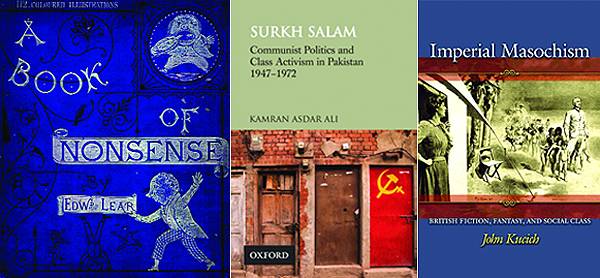

Surkh Salam: Communist Politics and Class Activism in Pakistan 1947 – 1972
Kamran Asdar Ali
Oxford (hardback), 2015
PRs 995
Pakistan today stands at a critical juncture in its short history of existence. While much has been written about Pakistan, little is known about post-Partition communism or left-leaning politics in the country, which played a key role in shaping Pakistani politics today. Kamran Asdar Ali here presents the first extensive look at the communist and working class movement in Pakistan. The author critically engages with the history of Pakistan’s early years, paying special attention to the rise and fall of the Communist Party of Pakistan (CPP), from Partition in 1947 to the aftermath of Bangladesh’s independence in 1971.
Since its formation in 1947 as a homeland for South Asian Muslims, Pakistan has been a configuration of shifting alliances and competing political and social ideologies. The country has experienced three military takeovers and is plagued with geopolitical conflict—from Kashmir to Baluchistan to Waziristan. While these aspects of Pakistan make headlines, in order to understand the complexities of these events, it is vital to understand the state’s relationship throughout history with its divergent political and ethnic voices. While the history of Pakistan is often viewed through the lense of unified Muslim nationalism, the author explores the history of Pakistan’s often tense relationship among various ethnic groups. Shedding light on a vital and little-researched aspect of Pakistan’s history, this book shows that military coups, Islamic radicalization, and terrorist activities do not constitute the sum total of Pakistan’s history, that its history includes the activities and contributions of communist intellectuals and activists.
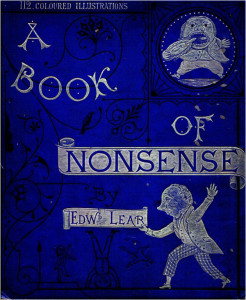
A Book of Nonsense
Edward Lear
Everyman’s Library (paperback), 2002
PRs 515
“He reads but he cannot speak Spanish, He cannot abide ginger-beer; Ere the days of his pilgrimage vanish, How pleasant to know Mr. Lear!” writes the 19th-century English poet Edward Lear in “Self Portrait of the Laureate of Nonsense.” When The Book of Nonsense was first published in 1845, under Lear’s pseudonym, Derry Down Derry, it was a success—some say it turned the once stodgy, didactic world of children’s literature on its head.
This rollicking poetic romp begins with “A Book of Nonsense” (1846), a slew of more-odd-than-bawdy limericks about the Young Lady of Wales, the Old Man of Vienna, and many, many more, all accompanied by the spare, whimsical ink drawings done by Lear himself. Part two urges readers to leap into “Nonsense Songs, Stories, Botany and Alphabets” (1871), including the classic “The Owl and the Pussy-cat” and “The Jumblies” (who “went to sea in a Sieve”), along with equally rib-tickling but lesser known selections such as “The Nutcrackers and the Sugar-Tongs.” In this section, you’ll also discover instructions for how to make Crumbobblious Cutlets, a “Nonsense Botany” guide featuring the Bottlephorkia spoonifolia and the Manypeeplia upsidownia, and “Nonsense Alphabets,” strange little poems about quills, rattlesnakes, screws, and other words beginning with letters.
Part three merrily inflicts “More Nonsense Pictures, Rhymes, Botany, &c.” (1877) on readers with the well-known plant Washtubbia circularis and more wacky limericks such as “There was an old person of Bar, / Who passed all her life in a jar, / Which she painted pea-green, to appear more serene, / That placid old person of Bar.” As icing on a very strange cake, the last section offers “Laughable Lyrics, A Fourth Book of Nonsense Poems, Songs, Botany, Music, &c.” (1877), notably including “The Pobble Who Has No Toes.” Lear’s quirky sense of humor infuses every line of his ever skillful verse, which is often alliterative, and always very silly. Lear, the Laureate of Nonsense, frolics frivolously, and no one should ever go to sea in a Sieve without a copy of this book in tow.
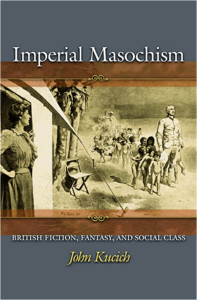
Imperial Masochism: British Fiction, Fantasy, and Social Class
John Kucich
Princeton University Press (hardback), 2007
PRs 4320
British imperialism’s favorite literary narrative might seem to be conquest. But real British conquests also generated a surprising cultural obsession with suffering, sacrifice, defeat, and melancholia. “There was,” writes John Kucich, “seemingly a different crucifixion scene marking the historical gateway to each colonial theater.” In Imperial Masochism, Kucich reveals the central role masochistic forms of voluntary suffering played in late-nineteenth-century British thinking about imperial politics and class identity. Placing the colonial writers Robert Louis Stevenson, Olive Schreiner, Rudyard Kipling, and Joseph Conrad in their cultural context, Kucich shows how the ideological and psychological dynamics of empire, particularly its reorganization of class identities at the colonial periphery, depended on figurations of masochism.
Drawing on recent psychoanalytic theory to define masochism in terms of narcissistic fantasies of omnipotence rather than sexual perversion, the book illuminates how masochism mediates political thought of many different kinds, not simply those that represent the social order as an opposition of mastery and submission, or an eroticized drama of power differentials. Masochism was a powerful psychosocial language that enabled colonial writers to articulate judgments about imperialism and class.
The first full-length study of masochism in British colonial fiction, Imperial Masochism puts forth new readings of this literature and shows the continued relevance of psychoanalysis to historicist studies of literature and culture.
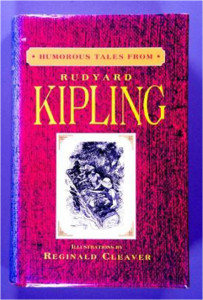
Humorous Rales
Rudyard Kiping
Studio Editions (paperback), 1993
PRs 330
Here in this omnibus edition is a collection of the best among Rudyard Kipling’s humorous tales for children. They bear proof of Kipling’s mastery over prose and lead the little readers to a realm of laughter and amusement, with a dig at this world of pomp and strife. This edition includes The Legend of Mirth, The Taking of Lungtungpen, Moti Guj-Mutineer, My Sunday at Home, Pig, Alnaschar and the Oxen, the Bull that thought, the finances of the gods, the Master-cook, The Fabulists, Gallio’s Song and My Lord the Elephant.
About the Author
RUDYARD KIPLING (1865-1936) was a poet, novelist and short story writer. He was born in Bombay. After his schooling in England, he moved over to India in 1882, where he began his journalistic career with Civil and Military Gazette, Lahore. By the time he returned to England in 1896, he had published many of his classic children/s stories that made him highly popular. In 1907 he was the first British author to be awarded the Nobel Prize for Literature.
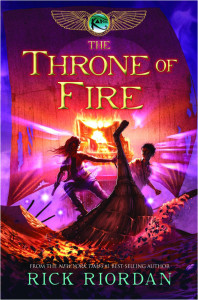

The Throne of Fire
Rick Riordan
Disney-Hyperion (paperback), 2012
PRs 795
Ever since the gods of Ancient Egypt were unleashed in the modern world, Carter Kane and his sister Sadie have been in trouble. As descendants of the House of Life, the Kanes have some powers at their command, but the devious gods haven’t given them much time to master their skills at Brooklyn House, which has become a training ground for young magicians.
And now their most threatening enemy yet - the chaos snake Apophis - is rising. If they don’t prevent him from breaking free in a few days’ time, the world will come to an end. In other words, it’s a typical week for the Kane family.
To have any chance of battling the Forces of Chaos, the Kanes must revive the sun god Ra. But that would be a feat more powerful than any magician has ever accomplished.
First they have to search the world for the three sections of the Book of Ra, then they have to learn how to chant its spells. Oh, and did we mention that no one knows where Ra is exactly?
Narrated in two different wisecracking voices, featuring a large cast of new and unforgettable characters, and with adventures spanning the globe, this second installment in the Kane Chronicles is nothing short of a thrill ride.

